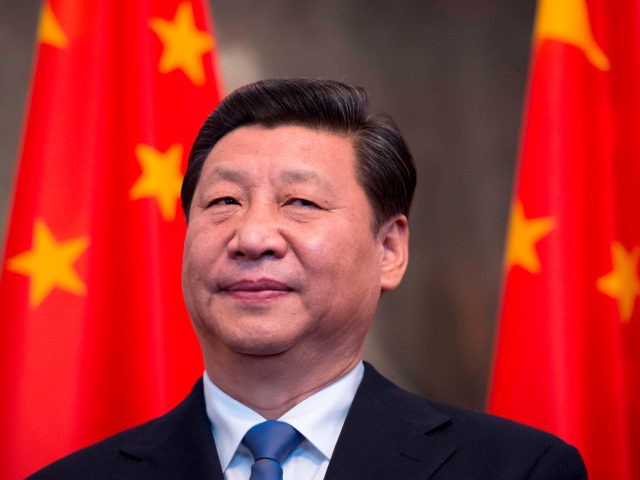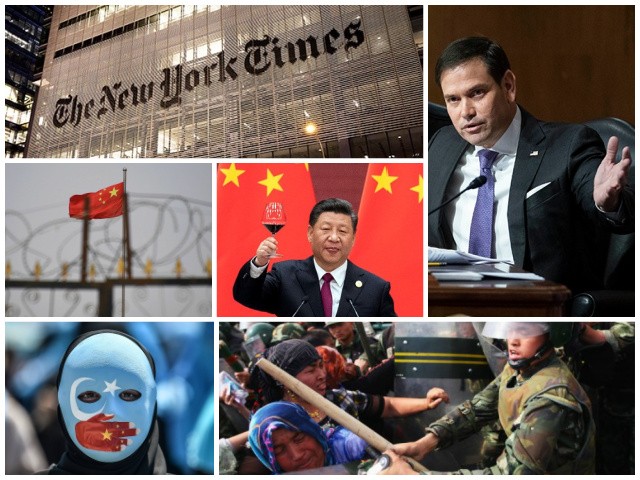Sen. Marco Rubio (R-FL) pressured the New York Times once again on Thursday to clarify if it had colluded with the Communist Party of China to hide documents implicating dictator Xi Jinping in the ongoing genocide of the Uyghur people in occupied East Turkistan, China.
Rubio sent a letter to the Times – a far-left publication that has won the Pulitzer Prize for publishing fake news whitewashing genocide – last week asking the same question, along with other inquiries related to the fact that the newspaper obtained documents in 2019 that would have revealed that the Chinese genocide of Uyghurs was not the product of rogue officials, but prompted by a directive from Xi himself. Human rights activists have repeatedly urged legal institutions such as the International Criminal Court (ICC) to prosecute Xi for genocide and crimes against humanity, but the ICC has refused on the grounds that it did not have sufficient evidence that Xi personally ordered the genocide – the kind of information the New York Times chose not to publish.
Following the first round of inquiries from Rubio, the New York Times assistant international managing editor Michael Slackman published a defensive response claiming Rubio was “wrong on the facts” and the Times had, in fact, “specifically connect[ed] the crackdown [genocide], including the internment of more than one million ethnic Uyghurs, Kazakhs and others, to Mr. Xi.”
Slackman admitted, however, that the newspaper “chose not to publish the documents in their entirety,” alleging, without elaborating, that doing so would have put the source who leaked the documents “at risk.”
On Thursday, Rubio responded in a letter to the publisher of the newspaper, A.G. Sulzberger, noting that Slackman did not answer most of the questions Rubio posed to the newspaper.
“In response to my November 30 letter, Assistant Managing Editor for International Michael Slackman confirmed that the New York Times intentionally withheld nearly every document,” Rubio wrote, “Critically important information was contained within the hundreds of pages that were hidden—and continue to be hidden—from the American people and governments across the globe.”
Rubio called the Times‘ answers “inadequate” and emphasized the need for the newspaper to explain what, if any, contact it had with the Chinese Communist Party before omitting evidence that implicated Xi Jinping personally in genocide.
“Perhaps most alarmingly, Mr. Slackman’s response failed to address my direct questions regarding the New York Times’ communication with the Chinese Communist Party,” Rubio wrote, repeating his questions:
Did the New York Times have any discussions or communications with the Chinese Communist Party and Chinese Government about any of the 403 pages it received? If so, did the Times make any deal or concessions to withhold the release of any of the documents, including Xi’s speech about what he wanted to do in Xinjiang?
Slackman failed to address this line of questioning in any way in his response.
The Chinese Communist Party expelled New York Times journalists from the country in 2020, as the world was beginning to realize the scope of the damage that the Chinese coronavirus – which originated in Wuhan, China, and fueled a pandemic directly because of policies the Communist Party implemented in Wuhan – could cause in nearly every country. The Times was one of several American media outlets to have their journalists expelled through to last month when China announced it would “ease” its restrictions on foreign journalists. The expulsion occurred, however, long after the initial reporting the Times did on the leaked documents regarding the genocide in East Turkistan, suggesting the two are unrelated.
It remains unclear at press time which outlets, including the New York Times, will benefit from the promised “easing” or if the newspaper was part of negotiations that resulted in this agreement.
The documents the New York Times chose not to publish surfaced elsewhere – in the hands of the Uyghur Tribunal, an independent attempt by a group of international lawyers and human rights activists to legally process the crimes China committed against the Uyghur people. The Uyghur Tribunal appeared to obtain the same documents separately and published more of their contents, including speeches by Xi Jinping to private meetings of Communist Party officials that clearly indicated a genocidal intent behind the repression of the Uyghur people and other Muslim ethnic minorities in East Turkistan.
The Uyghur Tribunal issued its verdict on Thursday: China was guilty of genocide “beyond a reasonable doubt.” The Tribunal found that, while China appeared not to be engaging in mass killing and extermination of Uyghur adults, evidence proved that Chinese officials were engaging in the mass extermination of Uyghur babies through both forced abortions and killing of infants. A mass sterilization campaign of Muslim women also corroborated the genocide charge. The legal definition of genocide includes “imposing measures intended to prevent births within the group.”
Among the other crimes the Tribunal exposed were acts of extreme torture in China’s vast network of concentration camps for Muslims, including “pulling off fingernails; beating with sticks; detaining in ‘tiger chairs’ where feet and hands were locked in position for hours or days without break; confined in containers up to the neck in cold water; and detained in cages so small that standing or lying was impossible.”
“Women detainees have had their vaginas and rectums penetrated by electric shock rods and iron bars. Women were raped by men paying to be allowed into the detention centre for the purpose,” the Tribunal documented, citing testimony from women who had escaped the camps. “One young woman of twenty or twenty-one was gang raped by policemen in front of an audience of a hundred people all forced to watch.”
The Tribunal derisively observed that it was not a legal institution with the power to act on any of its conclusions, but the institutions that did have that power refused to act.
“It would seem altogether more appropriate for such things to be dealt with by governments or international organisations. But governments have no courage to do such things; neither does the UN where a powerful state is involved,” the Tribunal’s judgment read. “Had any other official body or court, domestic or international, determined or sought to determine these issues the Tribunal would have been unnecessary and would not have been formed or would have ceased its work.”
The New York Times has an extensive history of defending communist crimes, including genocide. Most infamously, the newspaper won a Pulitzer Prize for “reporting” by Moscow journalist Walter Duranty that lied about Joseph Stalin’s genocide of the Ukrainian people known as the Holodomor. The Pulitzer Prize Board has refused to rescind the honor despite the abundantly clear reality that Duranty’s reporting was all fiction.


COMMENTS
Please let us know if you're having issues with commenting.